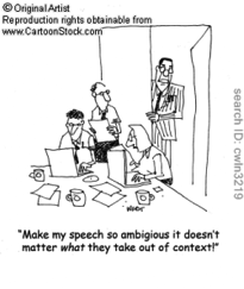|
with Jayne Besjak A "No Fallacy" Zone! We began class this week with an introduction to logical fallacies. These are errors in reasoning which students should learn to recognize and avoid in their own writing because they mislead the reader and weaken the argument. Specifically, we focused our attention on identifying fallacies of definition, including circularity, vagueness, and ambiguity (equivocation and amphiboly). With the use of some rather humorous examples, students were able to identify these errors in the use of logic and grammar that can lead to unclear expression. We will continue to identify various categories of fallacies as we progress through the semester, with the goal of becoming more astute at recognizing these in our everyday lives. Students then paired up and exchanged homework assignments to review. I asked them to provide comments on how effectively and thoroughly they felt their classmates were able to define the words I had assigned, keeping in mind the definition fallacies we just discussed. The word choices included: freedom, integrity, education. Significant concepts! I polled the students to determine how many found this definition exercise challenging. The answer – many! Defining your terms adequately can be challenging and feel somewhat elusive. However, it is a crucial first step in crafting a convincing argument for your audience. We will continue to practice and hone our skills in this area. Thesis Statements We then turned our attention to developing sound thesis statements. A strong thesis statement will clearly assert your claim and provide the overall structure for your argument. We looked at a number of example thesis statements to determine if they met the four required criteria:
HomeworkFor homework I have asked students to develop three thesis statements on three separate topics of interest to them. I have encouraged students not to simply google “persuasive writing topics” to identify an academic topic but rather to choose a subject they have a personal connection to or strong interest in. Answer these questions about yourself – What do I like? What frustrates me? What are my hobbies? What issues are relevant in my family or community? Your persuasive essays will be stronger and more convincing if you have a true vested interest in what you are arguing for!
Next week we will break into groups and brainstorm these thesis topics with the goal of helping students identify a topic for their first persuasive essay. Comments are closed.
|
Categories
All
Archives
May 2016
|




 RSS Feed
RSS Feed